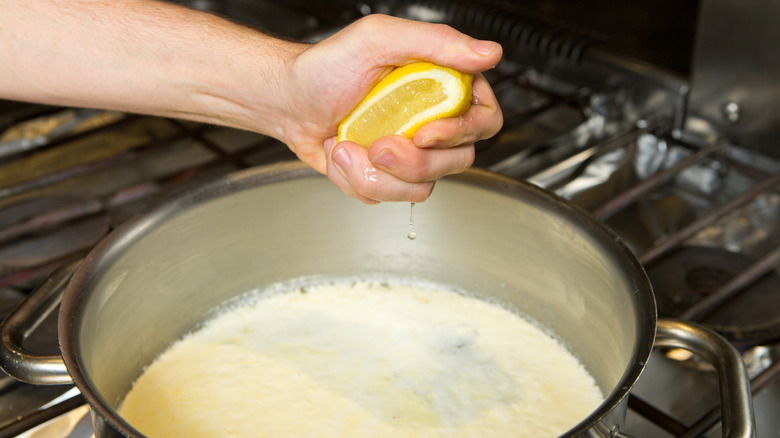How Your Cheese Sauce Will Benefit From A Spritz Of Lemon Juice
If you want to whip up a delicious mac and cheese or classic cheese fondue, you'll need to make a smooth, tasty cheese sauce. And if you've ever dipped your bread or veggies into a lumpy liquid, you know how important texture is here; smooth, silky cheese is one of the main reasons these dishes are so mouth-watering. But nailing the perfect consistency requires more than just melting your fromage on the stove. To ensure your sauce comes out creamy and luscious, incorporate a spritz of lemon juice.
Why is this necessary? An acidic element, like lemon juice, will prevent the calcium in the dairy from bonding with the protein (called casein). That's exactly what we want, since a successfully melted cheese is dependent on as few protein interactions as possible. When you heat your fromage and add an acidic component, the protein molecules then break down which leads to a creamier sauce. And while the sourness of lemon juice works well with the richer flavors in cheese, there's another reason this is an ideal ingredient to include: Citric acid is one of the more effective types of acid when it comes to preventing cheese proteins from bonding with calcium.
How to incorporate an acidic component into your cheese sauce
While lemon juice is an ideal acidic element to include in cheese sauce, it's not the only option you have. You could use straight sodium citrate, which is a citric salt that's made during citric acid fermentation and is often a secret ingredient in melted cheese sauce. Many fondue recipes call for a splash of white wine, which is also acidic. And when in doubt, feel free to use a little white vinegar, which will enhance the flavor of your sauce while bringing the needed acidic component to improve texture.
At what point in the sauce-making process should you pour in your acid? If you're making fondue with white wine, you'll want to simmer the wine in a pot first, then add your cheese in increments until a smooth liquid forms. If you're making your sauce for another reason (e.g. to pour over vegetables or nachos), try pouring a little lemon juice over your cheese before warming it up. Or, you can add it to the pot after the cheese has melted and you've taken it off the heat, just make sure to thoroughly stir to get rid of any clumps that may have formed. Whichever method you choose, adding a little lemon juice will pay off when you end up with a smooth, creamy sauce.

